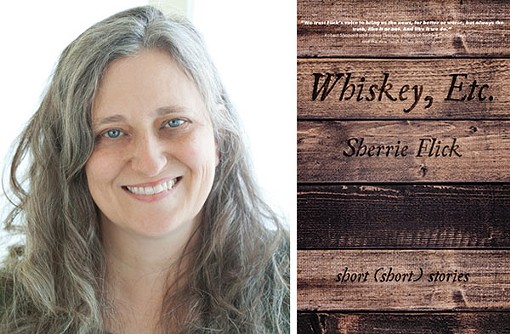A story totaling six words, and apocryphally credited to Hemingway, reads, “For sale: Baby shoes, never worn.” But while this might be the most famous example of flash fiction (narratives employing usually less than 1,000 words), concise literary forms like fable and haiku have been used for centuries. The genre seems tailor-made for today’s time-pressed reader, and Sherrie Flick’s new short-short-story collection Whiskey, Etc. packs her 207 easy-turning pages with punchy writing that centers on themes of love and loss.
Flick, author of the 2009 novel Reconsidering Happiness, lives in Pittsburgh and teaches in Chatham University’s master’s of fine arts and food studies programs. She is widely anthologized; she co-organized the acclaimed, now-defunct Gist Street Reading Series; and she writes a garden-to-table food column for Pittsburgh Quarterly. Given her complementary background in professional baking, it’s unsurprising that many of the collection’s 57 brief stories linger on food and drink in evocative ways.
In “Heidi Is Dead,” a Christmas buffet plays metaphor for the bloody demise of a runaway family pet. Contrasting this scene of domestic tragedy, Flick writes, “The shrimp’s naked bodies looked obscene compared to everything else, heaped together in a rubbery, cold mess with their cocktail sauce shimmering in the center of the display.” The story is told through the character of Jessica, who provides a sharp eye and sense of irony, but struggles to fit in as her in-laws grieve for a dog she never met. It’s also one of many stories that include pets.
In “The Paperboy,” a glass of milk sets the stage for a woman’s seduction of a neighborhood teen. The liquid’s whiteness signals purity that seems both fitting and at odds with the loss of innocence. After the deed, the narrator adds, “I imagined the boy as he got older. I knew someday he too would be unkind. Perhaps he would start to understand how unkindnesses can be helpful, how people can be complex, how life can surprise you unless you tell it what to do.” While the stories’ brevity means that most other characters throughout the collection remain unnecessarily developed, Flick’s first-person narrators cut compelling figures with their honesty and perspective.
In an interview in lit mag Ploughshares, Flick shares the insight “that writing about food has helped me tremendously in rendering setting. Because taste is so hard to describe, food writers often have to evoke context in order to relay a sense of an eating experience. This has made me pay attention to setting in a new way. Sounds, smells and detail help create the world in which we eat. It’s a way to take a reader into an experience. This easily translates into all experience in fiction.” This strategy works well in Whiskey, Etc., balancing the short form’s literary use of compression and distillation with the descriptive needs of story development.
One of many strong pieces that echo Flick’s sentiments on setting is “Learning to Drink Coffee in Idaho,” which follows a down-on-his-luck salesman who finds his brash attitude getting him nowhere, especially in this unnamed town with sidewalks “stuck together like a long string of Band-Aids.” Looking for caffeine, he’s directed to Darlene’s Diner, “a warm pink neon light perched in the window. It whispered open.” Seated in a booth, country music on the kitchen’s radio, he’s schooled in the art of sales by waitress Betty, who leaves “a faint smell of vanilla in her wake” as she goes to bring him her recommended pecan roll to go with his cup of java “dark and beautiful.” These accreted details, sensory and appealing, render the scene as genuine, almost alive.
Flick often imbues her work with an acute awareness of the dynamics surrounding couples and families. Between characters Sarah and Walt navigating a boozy night out with the elder Big Walt in “Unlocking,” or a mother and daughter making the best of a Thanksgiving meal in “Family Dinner,” conflict easily rises to the surface. This is perhaps best expressed by Martha in the latter story when she throws her hands up, thinking, “Fuck Family. Fuck love,” after her sister Louise balks at family get-togethers now that their father has died. These complicated emotions get effortlessly expressed and are easily relatable.
While Flick’s stories trade in the troubled emotional landscapes of characters, her own humorous voice remains steady. And much as Flick’s newcomer-to-Detroit in “Get Up” seeks friends by unwittingly joining a “heavy metal” yoga class, reader expectations about this literary style get challenged then embraced. As if dining on small plates of delicious food, doubters of brevity’s value will leave Whiskey, Etc. feeling pleasantly full.














